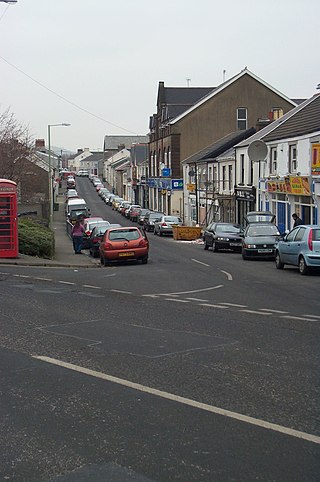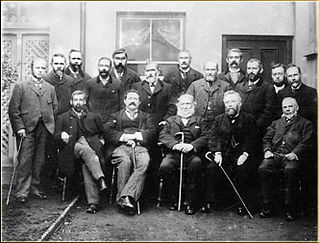
Aberaman is a village near Aberdare in the county borough of Rhondda Cynon Taf, south Wales. It was heavily dependent on the coal industry and the population, as a result, grew rapidly in the late nineteenth century. Most of the industry has now disappeared and a substantial proportion of the working population travel to work in Cardiff and the M4 corridor. Many residents also work in the nearby towns of Aberdare and Pontypridd.
Aberdare Urban District Council was a local authority in Aberdare, Wales.

The first election to the Aberdare Urban District Council was held in December 1894. It was followed by the 1896 election.
The Aberdare Urban District Council was established in 1894 and covered the parish of Aberdare. Its responsibilities included public health, sanitation, roads and public works generally.
The third election to Glamorgan County Council was held on 4 March 1895. It was preceded by the 1892 election and followed by the 1898 election.
The Glamorgan County Council election, 1898 was the fourth contest for seats on this authority. It was preceded by the 1895 election and followed by the 1901 election. Glamorgan was by far the largest county in Wales in terms of population. Glamorgan County Council had been established by the 1888 Local Government Act, and the first elections held in early 1889. The county of Glamorgan was at this time becoming heavily industrialised, although some areas such as the Vale of Glamorgan remained essentially rural. The rise of nonconformist liberalism, especially since the 1860s, throughout Wales, had challenged the prevailing influence of the landed gentry. However, even in 1889, the traditional forces remained influential and no working men were elected to the Council. This changed in 1892 with the unopposed return of David Morgan in Aberdare and the success of Isaac Evans in Resolven.
The 1901 Glamorgan County Council election was the fifth contest for seats on this authority in south Wales. It was preceded by the 1898 election and followed by the 1904 election. Glamorgan was by far the largest county in Wales in terms of population. Glamorgan County Council had been established by the Local Government Act 1888, the first elections being held in early 1889.
The 1904 Glamorgan County Council election was the sixth contest for seats on this authority in south Wales. It was preceded by the 1901 election and followed by the 1907 election. Glamorgan was by far the largest county in Wales in terms of population. Glamorgan County Council had been established by the Local Government Act 1888, the first elections being held in early 1889.
Aberaman is an electoral ward in Rhondda Cynon Taf, Wales. It was an electoral ward for much of the twentieth century, for the purposes of electing members to Glamorgan County Council and the Aberdare Urban District Council. The village of Aberaman was subsequently covered by two electoral wards, Aberaman North and Aberaman South, for the purposes of electing members to the Rhondda Cynon Taf County Borough Council. Aberaman North was composed mainly of Aberaman itself while Aberaman South included Abercwmboi, Cwmaman, Godreaman and Glynhafod.
Gadlys was, for much of the twentieth century, an electoral ward for the purposes of electing members to Glamorgan County Council and the Aberdare Urban District Council. Gadlys no longer forms an electoral ward and is part of Aberdare.
The 1907 Glamorgan County Council election was the seventh contest for seats on this local authority in south Wales. It was preceded by the 1904 election and followed by the 1910 election.
Aberdare Town was, for much of the twentieth century, an electoral ward for the purposes of electing members to Glamorgan County Council and the Aberdare Urban District Council. It currently comprises two electoral wards, Aberdare East and Aberdare West/Llwydcoed, for the purposes of electing members to the Rhondda Cynon Taf County Borough Council. Aberdare East is composed mainly of a part of Aberdare itself while Aberdare West includes the community of Llwydcoed which, for many years was itself as electoral ward.
The community of Llwydcoed, Rhondda Cynon Taf was, for much of the twentieth century, and electoral ward for the purposes of electing members to Glamorgan County Council and the Aberdare Urban District Council. Llwydcoed is no longer an electoral ward but forms part of Aberdare West/Llwydcoed electoral ward for the purposes of Rhondda Cynon Taf unitary authority elections
The Aberdare Urban District Council was established in 1894 and covered the parish of Aberdare. Its responsibilities included public health, sanitation, roads and public works generally.
The 1910 Glamorgan County Council election was the eighth contest for seats on this local authority in south Wales. It was preceded by the 1907 election and followed by the 1913 election.
The Aberdare Urban District Council was established in 1894 and covered the parish of Aberdare. Its responsibilities included public health, sanitation, roads and public works generally.
The Aberdare Urban District Council was established in 1894 and covered the parish of Aberdare. Its responsibilities included public health, sanitation, roads and public works generally.
The 1913 Glamorgan County Council election was the ninth contest for seats on this local authority in south Wales. It was preceded by the 1910 election and followed, due to the First World War, by the 1919 election.
The tenth election to Glamorgan County Council, south Wales, took place in March 1919. It was preceded by the 1913 election and followed by the 1922 election.
The twelfth election to Glamorgan County Council, south Wales, took place in March 1925. It was preceded by the 1922 election and followed by the 1928 election.

